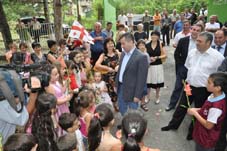Government starts “public dialogue”
By Messenger Staff
Wednesday, July 29

The idea of holding a “public dialogue” was voiced by President Mikheil Saakashvili. In his address to Parliament on July 20 he called on lawmakers to meet the ordinary citizens of Georgia. “We should start a large-scale dialogue with the people, involving trips to the provinces by officials and lawmakers. I also call on opposition lawmakers to join this campaign. We can turn this large-scale dialogue into new large wave of democracy,” the President said last week, calling on MPs, Ministers and local officials to spend the last month summer meeting the people and hearing their problems.
As part of this “public dialogue” the Georgian Parliament Speaker visited Zhinvali and met local residents. “We should cover all the regions, we should go to each region of Georgia in order to hear the problems of the population, to find out what needs to be done, to present our views. We will also hear what the people are going to do in the next years and we will plan the future development of the country together with the people,” the Chairman of the Parliament said. “We have many plans for next year, but we want these plans to be agreed and shared with our citizens,” Bakradze added. He also visited a kindergarten repaired through funding from the Georgian Parliament.
Minister of Penitentiary and Probation Dimitri Shashkin and Governor of Kvemo Kartli David Kirkitadze met IDPs from Tskhinvali on July 28. “The Ministers have started visiting the regions to get assignments from citizens. At the same time all institutions will help the population to solve their problems which lie within their field of competence,” Minister Shashkin told journalists. He was introduced to some of the judicial problems that IDPs in Shida Karti were facing. Lawyers from the Judicial Assistance Service Bureau of Shida Kartli helped about 200 IDPs with free judicial consultations about social assistance and real estate issues.
Meanwhile opposition leaders have also started visiting the regions. Members of the New Rights visited Poti in the Samegrelo region on Tuesday. David Gamkrelidze, Manana Nachkhebia, Mamuka Katsitadze and Pikria Chikhradze met local journalists in Poti and answered their questions. The leaders of New Rights say they will visit all the regions of Georgia and arrange meetings with local media representatives.
Irakli Alasania, the leader of Our Georgia-Free Democrats, also visited the Samegrelo region this week. “We stated as soon as our party was established that one of our main priorities will be a constant dialogue with the population. The aim of this dialogue is to hear their concerns, introduce ourselves to them and present our ways of resolving their problems,” Alasania said, adding that the newly created party will draw up its conception and programme by considering the problems listed by ordinary citizens,. “People are happy that party leaders are meeting them not only during the pre-election period. They feel that this is not being done to show off in front of the TV cameras, but because we want to really listen to their problems. They are pleased with this,” the leader of the Alliance for Georgia said.
“I find the actions of both the opposition and the administration a bit hard to understand,” political analyst Gia Khukhashvili has told The Messenger. He said that political parties should constantly work in the regions if they claim to be a political party, “so special visits to the regions by opposition leaders look a bit strange to me. A political process is not only rallies and demonstrations, it also includes working in the regions at the same time,” Khukhashvili said.
As for the “public dialogue,” the analyst said that the administration already has representatives in the regions and “visits by officials from Tbilisi are also strange”. “This reminds me of the Soviet period, when special meetings and councils were being held in the regions,” Khukhashvili said. “All this resembles a game; unfortunately we have a deficit of sufficiently professional politicians in Georgia,” he added.
